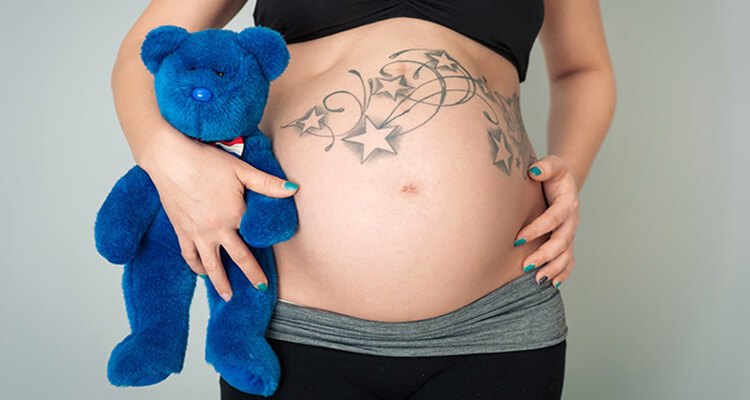Contents
- Risks Associated with Getting Tattooed While Pregnant:
- • Infection
- • Toxic tattoo inks
- • Skin reactions
- • Changes in skin during pregnancy
- Things to consider while getting a tattoo:
- • Visiting a professional parlor-
- • Considering the placement of the tattoo
- • Aftercare
- • Considering the pain
- • Tattoo removal
- Getting a tattoo removed during pregnancy:
Is Getting a Tattoo While Pregnant Safe?

Pregnancy is a significant milestone in your life. You’re getting ready to become a parent, and you’re in charge of the life that’s growing inside of you. During pregnancy, the majority of women avoid high-risk activities. However, what constitutes a high-risk situation isn’t necessarily black and white.
When it comes to pregnancy, tattoos are a bit of a hazy area. There is a scarcity of research on the subject, and there is no clear rule about its safety. Getting a tattoo is getting increasingly popular: one in every five people now has some sort of ink design on their skin. However, going under the needle when pregnant is a decision that should be made with caution.
The hazards of getting a tattoo include a small likelihood of an allergic response and infection, but they may be too much for you right now. You should also think about your personal pain threshold because having a tattoo isn’t easy and can be quite painful depending on where it’s placed.
Take some time to consider it, and talk to your doctor about having a tattoo ahead of time so you’re fully educated. If you’re considering getting a tattoo while pregnant, there are several options for doing it safely, but there are also concerns to consider. Medical professionals generally advise against it, and some tattoo parlors will not tattoo pregnant women.
Risks Associated with Getting Tattooed While Pregnant:
There hasn’t been a lot of research done on the safety of getting a fresh tattoo while pregnant. According to the little studies on tattoo ink, some of it may be digested or work its way through your lymph nodes. According to certain studies, certain ingredients in tattoo ink may be able to pass through the placenta.
Because tattoo ink dyes are not carefully controlled because they are considered a cosmetic product by the FDA, there have been rare occurrences of ink being tainted with bacteria or allergies. Then there’s the possibility of infection if you get stuck with a needle; in this situation, the major concern would be hepatitis B or C or HIV via a contaminated needle.
As required by state and municipal regulations, most tattoo parlors are meticulous about sanitation when it comes to their instruments and processes. Look for the following signs that the tattoo business you plan to visit is in good working order: Every client receives a licensed artist, an autoclave (a machine that sterilizes equipment), and new, unopened gloves, bandages, needles, and dyes.
Getting a tattoo has some known dangers, and some of those risks might cause serious difficulties in pregnant women. Before getting a tattoo while pregnant, you should be informed of the hazards.
• Infection
The first danger of getting a tattoo while pregnant is the potential of infection if the needles are not sanitized. Through the use of a needle, HIV or other illnesses can be transferred. The parlor should be clean, and the needles should be well sterilized.
• Toxic tattoo inks
Despite the fact that the average tattoo needle barely penetrates the skin for 1/8 of an inch, some tattoo ink contains heavy metals such as mercury, arsenic, and lead. These components can be harmful to your unborn child, especially during the first trimester when the baby’s major organs are still developing. Heavy metals might have an impact on your baby’s brain development. It can also make you more likely to have a miscarriage or stillbirth.
• Skin reactions
Dye ingredients might cause an inflammatory reaction, especially in the tattooed area. Different minerals are present in different dyes, and these minerals are responsible for the dyes’ hue. The body’s reaction varies depending on the color. Having a skin response when pregnant can make you feel even more uncomfortable. While corticosteroids can help alleviate the symptoms of some responses, they may not be safe to use during pregnancy or breastfeeding.
• Changes in skin during pregnancy
When you’re pregnant, your body changes and grows to accommodate the growing baby inside. Your tattoo may not appear the same after you’ve given birth and your body has healed, depending on where you got it.
Things to consider while getting a tattoo:
• Visiting a professional parlor-
While the FDA does not regulate tattoo ink, tattoo parlors are usually controlled by the state and/or local governments. As a result, they must be clean and safe. Most states require tattoo artists to have a license, so check with your state’s department of health or board of cosmetology for further information.
• Considering the placement of the tattoo
Keep in mind that your skin will change throughout pregnancy, and your tattoo may not appear the same once your baby is born. You should also avoid having a tattoo on your lower back if you expect to get an epidural during birth.
• Aftercare
It is possible to reduce the risk of infection by properly caring for your tattoo . While your tattoo is healing, keep it clean and minimize sun exposure and bathing in water. Contact your healthcare practitioner if you see signs of infection, such as redness or swelling.
• Considering the pain
A needle tattoo is not equivalent to a sticker or a painted-on pattern. You will feel real discomfort, especially in areas where the skin is thinner, such as the neck, hands, ankles, and feet.
• Tattoo removal
It’s painful to remove a tattoo, and laser removal isn’t recommended if you’re pregnant or breastfeeding.
Getting a tattoo removed during pregnancy:
Tattoo removal with lasers is preferred, although as previously said, this approach is not recommended if you are pregnant. If you really want to get rid of a tattoo, wait till after your baby is born. While tattoo removal technology is improving all the time, keep in mind that one-off removal is time-consuming and might leave permanent scars on your skin.
Still, if you’re dead set on getting rid of the tattoo right now, consult a dermatologist about your choices, which could involve surgery or dermabrasion. However, avoid using tattoo removal lotions or ointments because they frequently contain acids that can cause a rash or burn your skin.
